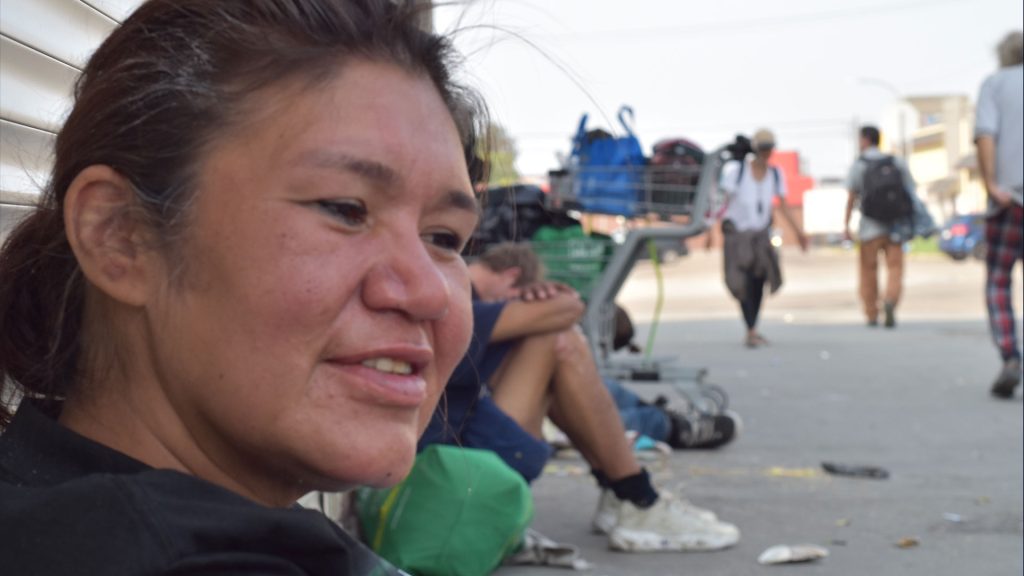
Sarah Abraham evacuated from Fort Smith. Photo: Danielle Paradis/APTN
An evacuation order has been lifted for Yellowknife three weeks after a nearby wildfire forced the city’s 20,000 residents to seek refuge in the south.
The order for the capital of the Northwest Territories, which also included the First Nation communities of Dettah and N’Dilo, was downgraded Wednesday to an evacuation alert.
As people begin the return journey home it is unclear if the unhoused population who were evacuated are being accounted for by any level of government.
“We will not know how many unhoused evacuees return until re-entry efforts have concluded. Numbers are monitored by the host jurisdiction and can change daily and passenger manifests for evacuees who will be returning on GNWT-arranged flights have not been finalized,” Robert Tordiff, assistant deputy minister for Indigenous affairs in the territory.
Elliot Tanti, a spokesperson for Boyle Street, an inner city organization that provides services to the unhoused population, said that they are not aware of the exact number of evacuees who have been accessing their services and weren’t asked by any level of government to track this information.
“We wouldn’t provide the services necessary [for evacuees] necessarily,” said Tanti.
Hearing from marginalized and unhoused evacuees
Sarah Abraham owns a small cabin in Fort Smith, N.W.T. and was among those evacuated. She’s currently staying in Edmonton.
Abraham was sitting on the ground beside people who were unhoused. When she was approached by APTN a man she met “from the streets” had been using her lap as a pillow.
“I am staying way on the southside where they gave me a hotel,” but Abraham said she was more comfortable downtown where she knew lots of people.
While she has been staying in Edmonton, Abraham has been assisting others who are unhoused. She administered Naloxone, the nasal spray that reverses opioid overdoses.
Abraham told APTN she is looking forward to returning home.
She is one of the thousands of people living in Hay River and Fort Smith, who were ordered out days before Yellowknife, but for the time being, remain displaced from their homes.
Read more:
N.W.T. premier takes feds to task for infrastructure issues during wildfire evacuations
Challenges in tracking the unhoused evacuees
In a previous press conference on Sept. 2, the GNWT spokesperson Robert Tordiff told reporters that there are “challenges” in tracking and assisting evacuees who were moved from the north.
“The GNWT and our partners are encouraging evacuees to communicate with us, but doing so is the individual’s choice,” said Tordiff in an emailed statement.
Tordiff mentioned one of the partners is the City of Calgary.
APTN reached out to the City of Calgary to ask about the process for tracking the unhoused population.
“We are not able to provide the number of evacuees who may have accessed the various supports available from those multiple partners,” said Jamie Stopa, a spokesperson for the city of Calgary.
“However, we do work closely with those agencies to ensure that they are able to provide up-to-date information to those individuals, including any information we receive from the Northwest Territories on how to return home.”
Tordiff told APTN that the territorial government is “committed” to helping all residents return to the N.W.T.
“We appreciate the efforts of municipal, provincial and territorial governments in Alberta, British Columbia, Manitoba and Yukon to support all residents of the N.W.T.
Beginning the long drive north
Kelsey Worth packed up her children, two cats and dog and drove to Alberta — first to Calgary, then High River, before settling in the hamlet of Cayley.
She is picking up groceries before beginning the long drive north on Thursday.
Worth said she doesn’t have to be back at work until Monday, so she is waiting an extra day so as not to clog up the highway with more traffic.
“We’ve got a few extra days where we can take it a little slower,” she said to the Canadian Press.
The Yellowknife Co-op said its shelves are stocked with groceries.
The city said its solid waste facility is to open Thursday and garbage pickup is also to start that day.
Residents have been advised they should prepare to be self-reliant for 72 hours upon their return.
With files from the Canadian Press










